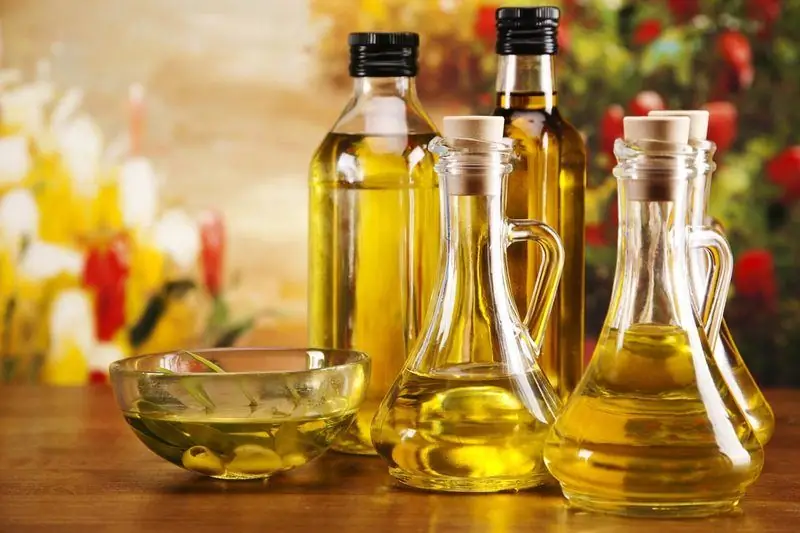
Table of contents:
- Author Bailey Albertson albertson@usefultipsdiy.com.
- Public 2023-12-17 12:53.
- Last modified 2025-01-23 12:41.
Which oil is healthier: refined or unrefined?

It's amazing how our understanding of healthy food is changing. In the late 90s, for example, we were actively convinced that a sensible housewife would always prefer refined butter to unrefined. Old-timers probably still remember the vociferous daughter from the advertisement, who indignantly asked from the screen: "Mom, in what oil are you frying ?!" and a shaking bottle of clear refined liquid. But a little time passed, and the product that fell into disgrace began to return to our kitchens again. Is it good or bad?
Refined and unrefined oils: advantages and disadvantages
Without going into the details of technology, there are two ways to turn seeds and fruits of plants into oil:
- by cold pressing, passing them through a special press;
- multi-stage cleaning using high temperatures and chemicals.
The first method gives us unrefined oil - fatty, aromatic, with a rich taste and pronounced color and retaining a maximum of useful properties.
The second one delivers refined oil to our table - lighter, almost transparent, having neither smell nor taste, but, unfortunately, has lost together with them the lion's share of medicinal compounds.

Refined oil is purified from pigments, aromas and most of the beneficial compounds
It would seem that the choice is obvious? We take what is more useful and dismiss the empty and useless in eternal retirement?
Not certainly in that way.
Refined oils have at least one undeniable plus. Their "smoke point" - the temperature at which the oil begins to smoke and decompose into carcinogenic substances harmful to human health - is significantly higher than that of an unrefined product. For example, if you pour unrefined sunflower oil into a frying pan, it will turn into a real poison for the body already at 107 °, while the same oil that has been deeply refined will retain its properties up to 232 °. Do you feel the difference? So the daughter from the old ad was completely right.

Unrefined oil, when heated, foams, fumes and releases carcinogens hazardous to health
In addition, refined oil:
- it is freed during the cleaning process not only from fatty acids, vitamins and other useful substances - which is annoying - but also from pesticides that could be used in the cultivation of oilseeds, which is good;
- not afraid of direct sunlight, which does not work well on unrefined oil, and has a longer shelf life;
- does not add extra flavoring and aromatic notes to the dishes, which are not appropriate in every dish.
What is the conclusion? For a complete and proper nutrition, we need both types of oil:
- unrefined - for dressing salads and other cold dishes;
- refined - for frying, stewing and other methods of thermal processing of products.

Unrefined oil is in any case more useful than refined oil, regardless of which plant it was obtained from
Will the above be true for all types of oils?
In general, yes. Although some of them - for example, mustard, sesame and edible coconut - are allowed to be used for frying unpeeled, since they have a high smoke point (254, 230 and 232 o C, respectively). But in most cases, nutritionists and doctors advise adhering to the general rule, assigning the role of dressing in cold dishes for unrefined oils.
Video: the benefits and harms of vegetable oils
Finally, we note that manufacturers of both cold and hot-pressed oils are not always clean on the hand. For many, it is the cheapness and simplicity of technology that come to the fore, not the quality of the final product. In order not to deal with such would-be owners, try to purchase goods from well-known brands that value their reputation: the probability of buying good oil will be higher.
Recommended:
How To Choose The Right Grinder: Which Angle Grinder Is Better For Home And Summer Cottages + Video

Grinder selection criteria. Rating of the most popular models. Reviews of manufacturers. Tips: how to choose a grinder for home, professional use
Gasoline Generator: Which Is Better To Choose, How To Connect To The Network And Use, Malfunctions (does Not Start, Works In Jerks, Oil Change)

Purpose and types of gasoline generators. How to choose a generator. Features of use, major malfunctions and DIY repair
How To Choose A Kitchen Knife: Which Company Is Better And From Which Material

Rules for choosing knives for work in the kitchen. Types of knives, their distinctive qualities. Selection criteria, best manufacturers
Why You Can't Fry In Unrefined Oil, Including Sunflower And Olive Oil

Is it possible to fry in unrefined oil: objective reasons and myths
Olive Oil Brands - Which Are Better, Reviews

Selection criteria for quality olive oil. TOP-12 olive oil producers
